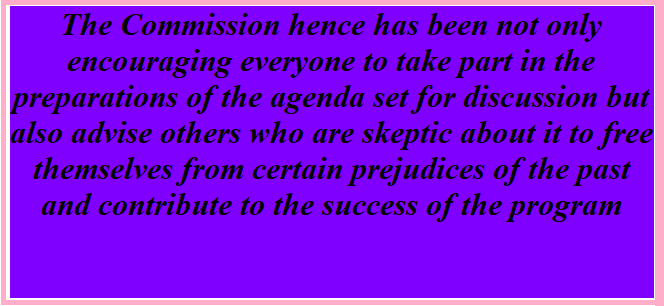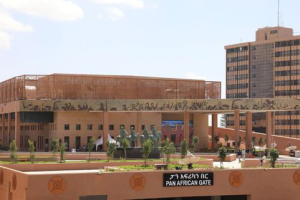
Today, Ethiopia is not in any way ready to engage in some sort of warfare especially after the recent deadly conflict that has cost the country untold resources well above its capacity. Many people say that for years, Ethiopia’s political problems have always been swept under the rug instead of seeking a lasting and well accepted solution by the population. We see that the country has been struggling to plant the seeds of democracy and join the list of countries with a modern federal system of government but we also see that there are fundamental disagreements on key issues that make up the country.
There are many people who believe that the long legacy of a history of oppression and injustices that characterized the Ethiopian state as a whole has meant that these grievances have remained in one way or another and linger up to the present date. With the socio-political awareness of the various sections of the population the dissatisfaction of people became rampant and difficult to address. The so called elites of the society who have had exposure to modern education seem to be the ones who are now trying to sing war hymns or beat drums of war instead of inviting people to calm down and seek peaceful negotiated arrangements and go ahead.
The current federal system of the country was meant to address the issues that people may have had with respect to their identity and the sharing of power and resources equitably and having a say in their own future. But even this arrangement is facing not simple challenges.
It should not be forgotten that Ethiopia is a mosaic of peoples and cultures and administering such a huge reality is by no means an easy task. It has several challenges.
There are continuous challenges to the central government therefore and these uncertainties and confrontations have been creating instability and that is a huge challenge for a country that has very limited resources and needs to cater for the survival of millions of people. The economy hence becomes key in trying to address the needs of millions. Only sustained growth could manage to alleviate the sufferance of these people and secure employment but growth is inconceivable when there are various forces that work against the government.
For quite a long time, political forces in the country have been advocating and urging for something that would bring together all political and social associations and groups and deliberate in honest and frank discussions searching for what they called national consensus. A National Dialogue Commission has been formed to address this issue and for the last several months has been preparing to move ahead in the direction of seeking all parts of the society to have some representation and participation in the discussions.
The commissioners have repeatedly appeared on TV and other media to tell people the programs and activities of the National Dialogue Commission and how they go about in the discussions. Many have said finally we can now say what we think about what to do with our life in this community and make our voices heard. And that is exactly what the Commission has been trying to do for months.
A few days ago, the Commission held a meeting in Addis Ababa in which a presentation was made regarding what developments were being carried out by the body. The chief commissioner of the Ethiopian National Dialogue Commission, Professor Mesfin Araya said political parties should play a significant role in creating national consensus and national peace in the dialogue. He also pointed out that for the national consultation, the participation of five regions and one city administration was already carried out.
The Commission held a discussion a few days ago in Addis Ababa with the officials and representatives of various political parties regarding the preliminary preparation phase of the participatory process.
Commissioner Professor Mesfin Araya said that the commission is completing the preparatory phase based on its schedule of preparatory work. He indicated that to complete the preparation phase, the participants will be identified and representatives from district to region will be selected and a national agenda will be gathered.
He mentioned that the task of gathering an agenda includes all Ethiopians living in the country and abroad. Prof. Mesfin also said that political parties are the leading participants in the participatory process and are playing a major role in adopting the consensus framework.
He said that they will help the credibility of the process by supporting an inclusive and independent participation process. The commission also stated that it has conducted discussions and participation visit in Harar, Sidama, Southwest Ethiopia Peoples, Gambella, Benshangul Gumuz regions and Dire Dawa administration.
He emphasized that the peace and security threats observed in the discussions in the regions could create obstacles to the consultation process and should be stopped.
Professor Mesfin has asked for more collaboration among political parties and other forces to contribute to the success of the Commission’s work by explaining to their constituencies about the intentions of the discussions and why this is the best and in many ways perhaps the last chance that the country could have to come together to one direction and try to heal the old wounds of the past. It would be a wonderful opportunity to discuss frankly the truth as
opposed to certain unfounded and may be politically motivated narratives that divide people and sow seeds of hatred and revenge than reconciliation and pardon for eventual damages.
Ethiopia like any other country cannot live in the past nor can it live talking only about the mistakes or misdeeds of the past. In the history of any society and state there could be undesirable events that have taken place but now that things have changed the past will have to be addressed with reasonable and due caution because judging the past with current standards would be illogical and unacceptable. For instance calling for account the current generation of people for what their forefathers allegedly committed would be absurd.
So many things have changed since those days and it would be better to go ahead laying to rest the past and hopefully learning from those events and avoid committing the same mistakes again. History moves ahead and turning back is inconceivable and a people that do not learn from their past history are doomed to repeat them and that would only result in devastating consequences.
The National Dialogue Commission is trying to carry out its mission transparently and with full accountability by renowned and reputed professionals with vast educational and professional experience such as Professor Mesfin who have at heart the fate of their country and would like to see a new Ethiopian society that does not live in the past but aspire to new heights in the world society of today.
The discussions that will be held among all representatives of every community, every ethnic and religious group will bring about light on all outstanding issues that have been either kept hidden for various reasons or lied about to avoid certain undesirable consequences. Only with frank and honest discussions of every social issue of the past and present among all representatives of the country could there be hope to clear things and bring all communities together with justice and equality and head on for the future.
The Commission hence has been not only encouraging everyone to take part in the preparations of the agenda set for discussion but also advise others who are skeptic about it to free themselves from certain prejudices of the past and contribute to the success of the program. This is the first time that such a huge campaign is staged and the commissioners hope that every part of the country takes part. In this respect they have asked for the collaboration of the government to prepare the necessary conditions in places where there are security issues like for instance in some zones of Oromia Region. As they want everyone aboard, they do not want to skip certain places only because of security issues.
The chief commissioner was saying that even in zones where there could be conflicts, they try to summon some people from those areas and invite them to contribute to the national dialogue because this is an all-embracing process and not one that intends to leave anyone behind. In this respect also Ethiopians in the diaspora are invited to contribute their share for the discussion because they too are part of the deliberations.
Such national dialogues have worked well in countries where they have been carried out properly and Ethiopia wants to emulate those commissions. For the success of the commission hence everyone must be honest, straightforward and candid as well as well-intentioned for the success of the Commission so that the result could be a united and strong Ethiopia constituted on the rule of law and justice, a society that treats all the peoples of the country equally. Ethiopians must once and for all come to terms with their ‘ugly’ past and contribute to work for a better country today and for the future generation as well.
BY FITSUM GETACHEW
THE ETHIOPIAN HERALD THURSDAY 10 AUGUST 2023





